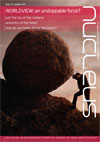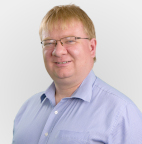'To work constructively in scientific research and in training others for the benefit of individual patients and the advance of healthcare throughout the world.'
'I was merely thinking god's thoughts after him.' This is how Johannes Kepler (1571-1630) described his work. Kepler was not only a mathematician and astronomer, but studied theology at the University of Tübingen. Committed to a sun-centred universe, Kepler was a contemporary of Galileo. Being a protestant did not protect Kepler from persecution; though the Vatican didn't put him on trial like Galileo, Kepler was removed from a teaching post in Graz, Austria, early in his career because of his protestantism. (1)
Although theologically trained scientists like Kepler may be relatively rare, the profound metaphysical issues raised by science continue to be much discussed. Cosmology (the study of the origins and development of the universe) currently seems to be the most frequent starting point, with professor Stephen Hawking perhaps the most prominent physicist who has written about both the universe he studies and his conclusions about its origins. (2)
Medicine
There is much science in the study of medicine, as those in the early part of a medical degree know only too well. 'The heavens declare the glory of god' (psalm 19:1); the human body is 'fearfully and wonderfully made' (psalm 139:14), and is surely the pinnacle of creation. Understanding it is fascinating, whether you are a medic or not. During my first Christmas at home from medical school, my grandmother quite spontaneously started to look carefully at my dissection atlas. She was 89 and had left school at age 13, nearly a decade before Fleming discovered the properties of penicillin. We are privileged to have much more education than my grandmother would ever imagined possible in the 1920s, and we can follow Kepler in thinking god's thoughts after him as we study the human body.Research
Therefore, it should not be difficult to see why the Christian might maintain an interest in medical research, which helps us understand the body and its pathologies more deeply. Adam could be said to have been the first 'researcher' as he studied and named animals. Of course, such work is not confined only to Christians, and many workers in this field are motivated by a love of the science itself, as well as by compassion for the patients that their work will eventually help. Many Christians will share these motivations, but will also be conscious of God the creator in their work.
The research envisaged by CMF's tenth value may take many forms. Much that you will read and see early in medical training is lab-based science. A rat's heart may seem very distant from patient treatment. Yet this underlying work, often undertaken when the clinical benefits might not have been obvious, is essential for our understanding of the body. We would not have ACE-inhibitors without sophisticated chemical engineering techniques, for example. (3) In clinical studies, research may be more obviously patient-centred. a new drug or surgical intervention might be compared either with placebo or a current 'gold standard' treatment. Research happens in the community too. My practice recently took part in a study to help develop a predictive tool enabling GPs to make better decisions about antibiotic treatment or onward referral in children with a cough. (4)
Passing on the baton
Passing knowledge on should already be second nature in our christian lives. The vast majority of people come to faith because someone told them about Jesus. Paul expected Timothy to pass on his teaching: 'and the things you have heard me say in the presence of many witnesses entrust to reliable people who will also be qualified to teach others' (2 Timothy 2:2).
The wider world usually respects the passing on of knowledge. the Hippocratic Oath makes reference both to the respect in which a student must hold their teacher, and to the duty of the student to teach others.
You might think, 'what can I teach someone as a student?' You would be surprised what you do know. Every time you explain a procedure or a condition to a patient, you are teaching them and helping them to better manage and cope with their illness. You may well already be of help to students in the years below you at medical school, and might learn a lot yourself if you help those you know with their studies. and qualification comes around very quickly; even as an FY1 you will need to be able to pass on your knowledge to students. Even if you take on no formal teaching role, you will be supervising junior staff later in your career.
Get into practise now.
It all seems positive: what are the difficulties?
Research and training are time-consuming. Day-today clinical work can easily squeeze out both. When there is ever-rising clinical demand on a background of unchanged staff and resources, something must inevitably give. all too often educational and research activities are the first to go. That might be reasonable once a year with the hospital on black alert and widespread staff sickness, but high-pressure situations are increasingly becoming the new 'normal'. Consideration must be given to how education can continue.
Who benefits from research and education? CMF's value includes the phrase 'throughout the world'. The disease burden can vary markedly between higher and lower income countries. But with more money to spend on healthcare in the developed world, there is often a focus on 'western' diseases. Add to that the fact that a drug which is a lifelong treatment for a chronic disease will usually be much more profitable than a new type of antibiotic that might be prescribed for a five or seven day course, and it is easy to see how a big disparity can occur. Before rushing to criticise the pharmaceutical industry, we must remember that the costs of developing a new drug are immense, and much (costly) work is done on possible treatments that never even reach a clinical trial. Scientific American suggests US$2.5 billion as an average cost. (5)
Given these factors, how can we ensure that research and training are of benefit throughout the world? On a wider scale, we might be active in the political arena and supportive of programmes that promote research into diseases more common in the developing world. We might lobby government to ensure that UK-based companies are not exploiting patients in poorer countries as they conduct their research. We shouldn't forget the role of public health, covered in some detail previously in Nucleus. (6)
There is much we can do in lower income countries in terms of training. Despite the problems in the British system currently, UK medical training is very highly regarded in much of the world. We have a tremendous opportunity to share our knowledge with those who have less well-developed training, whether by working overseas long-term and including teaching in our roles, or whether on short trips such as those organised by PRIME. (7) Those of us still in the UK could stay in touch with a colleague working long-term overseas in our field, helping them to keep up to date with current medical trends.
What can I do now?
You might not feel ready to set up a medical school just yet (!), so let's end with some ideas that might help as a student.
Above all, learn to read a paper well. Even if you never conduct a piece of research, you can't make informed decisions about treatment if you don't know how to evaluate the work of others. Trish Greenhalgh's How to Read a Paper (8) is a good start.
Give serious consideration to an intercalated BSc; whatever the subject, the chance to learn and think more broadly will be useful whether or not the exact degree title is that relevant to what you eventually do. If you don't have the opportunity or funds for this, try to ensure you undertake at least one SSc that involves some research.
Learn to teach. You will be imitating Jesus, who was a great teacher. Even if you never take a formal 'teaching' role you will need to help patients understand their conditions. Observe what is good and less good in those who teach you. Think about taking specific courses (whether SSCS as a student, or specific training courses as a junior doctor, which are often free). Of course, this skill won't go amiss in the Christian world as well. Not every doctor is a professor, but all share knowledge with others. not every christian is a preacher, but we are all to 'spur one another on to love and good deeds' (Hebrews 10:24).
The human body is not simple, and medicine can be a difficult subject. When the going is difficult, be reassured that you are not simply learning and deriving facts and figures. The body which you are learning about is made in God's image, and Jesus became a man and walked with us on earth.
































